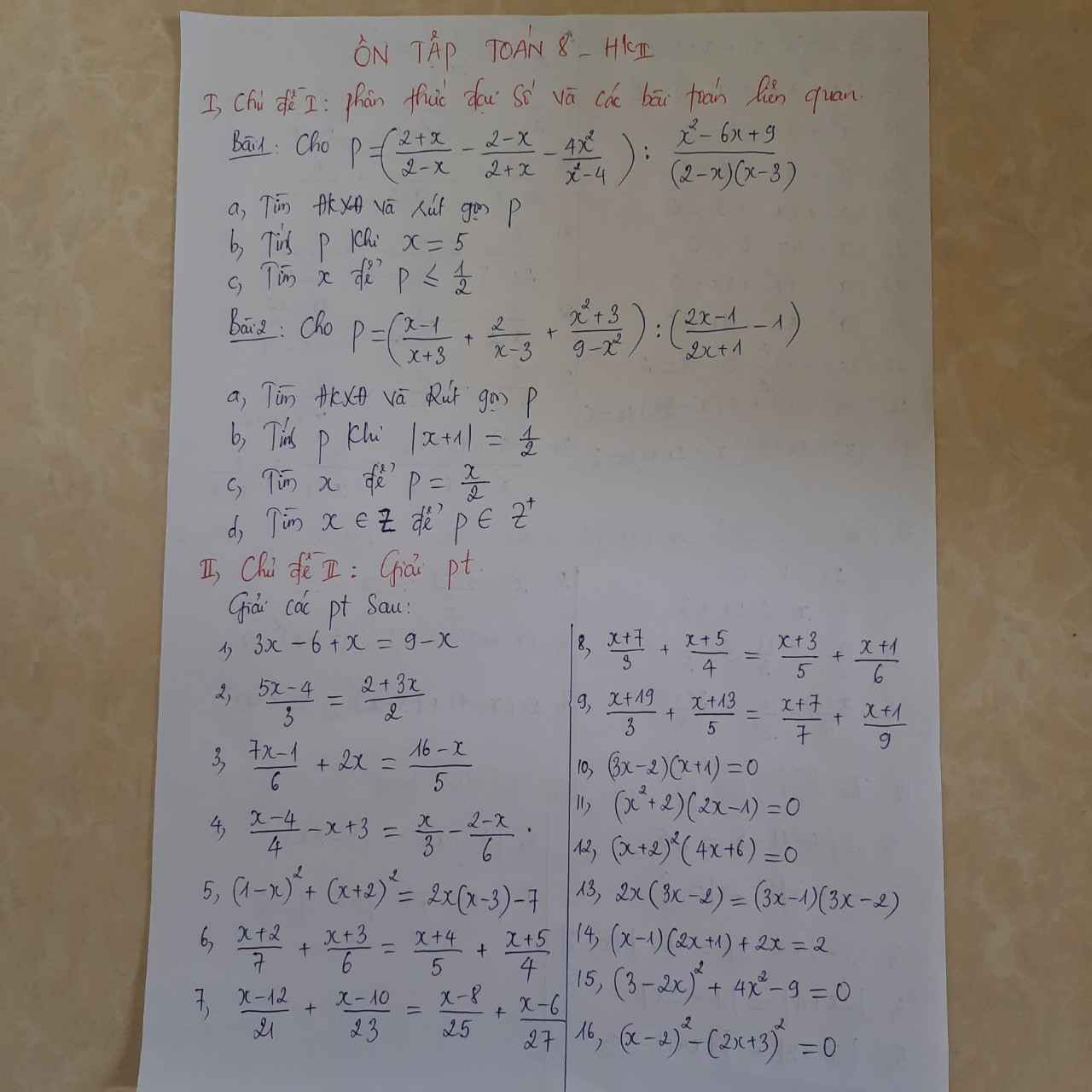Hãy nhập câu hỏi của bạn vào đây, nếu là tài khoản VIP, bạn sẽ được ưu tiên trả lời.

Đặt tính \(2n^2-n+2\) : \(2n+1\) sẽ bằng n - 1 dư 3
Để chia hết thì 3 phải chia hết cho 2n + 1 hay 2n + 1 là ước của 3
Ư(3) = {\(\pm\) 3; \(\pm\) 1}
\(2n+1=1\Leftrightarrow2n=0\Leftrightarrow n=0\)
\(2n+1=-1\Leftrightarrow2n=-2\Leftrightarrow n=-1\)
\(2n+1=3\Leftrightarrow2n=2\Leftrightarrow n=1\)
\(2n+1=-3\Leftrightarrow2n=-4\Leftrightarrow n=-2\)
Vậy \(n=\left\{0;-2;\pm1\right\}\)

Câu 4:
a: ĐKXĐ: \(x\notin\left\{0;-5\right\}\)
b: \(A=\dfrac{x^2+2x}{2\left(x+5\right)}+\dfrac{x-5}{x}+\dfrac{50-5x}{2x\left(x+5\right)}\)
\(=\dfrac{x^3+2x^2}{2x\left(x+5\right)}+\dfrac{2\left(x^2-25\right)}{2x\left(x+5\right)}+\dfrac{50-5x}{2x\left(x+5\right)}\)
\(=\dfrac{x^3+2x^2+2x^2-50+50-5x}{2x\left(x+5\right)}\)
\(=\dfrac{x^3+4x^2-5x}{2x\left(x+5\right)}=\dfrac{x\left(x^2+4x-5\right)}{2x\left(x+5\right)}\)
\(=\dfrac{x\left(x+5\right)\left(x-1\right)}{2x\left(x+5\right)}=\dfrac{x-1}{2}\)
c: Để A=-3 thì x-1=-6
hay x=-5(loại)

\(A=3x^2-12x+10\\ A=3x^2-12x+12-2\\ A=\left(3x^2-12x+12\right)-2\\ A=3\left(x^2-4x+4\right)-2\\ A=3\left(x^2-2\cdot x\cdot2+2^2\right)-2\\ A=3\left(x-2\right)^2-2\\ Do\left(x-2\right)^2\ge0\forall x\\ \Rightarrow3\left(x-2\right)^2\ge0\forall x\\ \Rightarrow A=3\left(x-2\right)^2-2\ge-2\forall x\\ \text{Dấu “=” xảy ra khi : }\\ \left(x-2\right)^2=0\\ \Leftrightarrow x-2=0\\ \Leftrightarrow x=2\\ \text{ Vậy }A_{\left(Min\right)}=-2\text{ khi }x=2\)
A=3x2 - 12x + 10
A= (3x2- 2.3x.2+22)-22+10
A= (3x-2)2+6 \(\ge\) +6
Vậy min A = 6 . Dấu = xảy ra khi 3x -2 = 0
3x= 2
x= \(\dfrac{2}{3}\)

a) \(x^3-\dfrac{1}{9}x=0\)
\(\Rightarrow x\left(x^2-\dfrac{1}{9}\right)=0\)
\(\Rightarrow x\left(x-\dfrac{1}{3}\right)\left(x+\dfrac{1}{3}\right)=0\)
\(\Rightarrow\left[{}\begin{matrix}x=0\\x-\dfrac{1}{3}=0\Leftrightarrow x=\dfrac{1}{3}\\x+\dfrac{1}{3}=0\Leftrightarrow x=-\dfrac{1}{3}\end{matrix}\right.\)
b) \(x\left(x-3\right)+x-3=0\)
\(\Rightarrow\left(x-3\right)\left(x+1\right)=0\)
\(\Rightarrow\left[{}\begin{matrix}x-3=0\Rightarrow x=3\\x+1=0\Rightarrow x=-1\end{matrix}\right.\)
c) \(2x-2y-x^2+2xy-y^2=0\) (thêm đề)
\(\Rightarrow2\left(x-y\right)-\left(x-y\right)^2=0\)
\(\Rightarrow\left(x-y\right)\left(2-x+y\right)=0\)
\(\Rightarrow\left\{{}\begin{matrix}x-y=0\Rightarrow x=y\\2-x+y=0\Rightarrow x-y=2\end{matrix}\right.\)
\(\Rightarrow\left\{{}\begin{matrix}x=y\left(1\right)\\\left(1\right)\Rightarrow x-x=2\left(loại\right)\end{matrix}\right.\)
d) \(x^2\left(x-3\right)+27-9x=0\)
\(\Rightarrow x^2\left(x-3\right)+\left(x-3\right).9=0\)
\(\Rightarrow\left(x-3\right)\left(x^2+9\right)=0\)
\(\Rightarrow x-3=0\Rightarrow x=3.\)

x11+x4+1
= x11+x10+x9-x10-x9-x8+x8+x7+x6-x7-x6-x5+x5+x4+x3-x3-x2-x+x2+x+1
= x9(x2+x+1)-x8(x2+x+1)+x6(x2+x+1)-x5(x2+x+1)+x3(x2+x+1)-x(x2+x+1)+(x2+x+1)
= (x2+x+1)(x9-x8+x6-x5+x3-x+1)

Xét hình thang cân ABCD có:
MA=MB (M là trung điểm AB:gt)
=>MA đối xứng với MB qua MN
AD=BC (do ABCD là htc)
=>AD đối xứng với BC qua MN
ND=NC (N là trung điểm của AC:gt)
=>ND đối xứng với NC qua MN
Do đó tứ giác MADN đối xứng với tứ giác MBCN qua MN
Vậy htc ABCD có một trục đối xứng là MN

\(3x^2+7x-20=0\\ < =>3x^2+12x-5x-20=0\\ < =>3x\left(x+4\right)-5\left(x+4\right)=0\\ < =>\left(x+4\right)\left(3x-5\right)=0\\ =>\left\{{}\begin{matrix}x+4=0\\3x-5=0\end{matrix}\right.\\ =>\left\{{}\begin{matrix}x=-4\\x=\dfrac{5}{3}\end{matrix}\right.\)
Vậy: Tập nghiệm của phương trình là \(S=\left\{-4;\dfrac{5}{3}\right\}\)
do câu hỏi của lớp 8 nên mình làm ntn nha:
pt <=> \(3x^2+7x=20\)
<=> \(x^2+\dfrac{7}{3}x=\dfrac{20}{3}\)
<=> \(x^2+2.\dfrac{\dfrac{7}{3}}{2}x+\dfrac{49}{36}-\dfrac{49}{36}=\dfrac{20}{3}\) <=> \(\left(x+\dfrac{7}{6}\right)^2=\dfrac{49}{36}+\dfrac{20}{3}\)
<=> \(\left(x+\dfrac{7}{6}\right)^2=\dfrac{289}{36}\)
<=> x+7/6 = \(\pm\sqrt{\dfrac{289}{36}}\)
<=> \(\left[{}\begin{matrix}x=\dfrac{5}{3}\\x=-4\end{matrix}\right.\)



8) \(\dfrac{x+7}{3}+\dfrac{x+5}{4}=\dfrac{x+3}{5}+\dfrac{x+1}{6}\)
\(\Rightarrow\dfrac{x+7}{3}+\dfrac{x+5}{4}-\dfrac{x+3}{5}-\dfrac{x+1}{6}=0\)
\(\Rightarrow\dfrac{x+7}{3}+2+\dfrac{x+5}{4}+2-\dfrac{x+3}{5}-2-\dfrac{x+1}{6}-2=0+2+2-2-2\)
\(\Rightarrow\left(\dfrac{x+7}{3}+2\right)+\left(\dfrac{x+5}{4}+2\right)-\left(\dfrac{x+3}{5}+2\right)-\left(\dfrac{x+1}{6}+2\right)=0\)
\(\Rightarrow\left(\dfrac{x+7}{3}+\dfrac{6}{3}\right)+\left(\dfrac{x+5}{4}+\dfrac{8}{4}\right)-\left(\dfrac{x+3}{5}+\dfrac{10}{5}\right)-\left(\dfrac{x+1}{6}+\dfrac{12}{2}\right)=0\)
\(\Rightarrow\left(x+13\right)\left(\dfrac{1}{3}+\dfrac{1}{4}-\dfrac{1}{5}-\dfrac{1}{6}\right)=0\)
\(\Rightarrow\left[{}\begin{matrix}x+13=0\\\dfrac{1}{3}+\dfrac{1}{4}+\dfrac{1}{5}+\dfrac{1}{6}=0\end{matrix}\right.\)
\(x+13=0\)
\(\Rightarrow x=-13\)
\(\dfrac{1}{3}+\dfrac{1}{4}+\dfrac{1}{5}+\dfrac{1}{6}=0\)
\(\dfrac{13}{60}=0\) (vô lí)
Vậy \(x=-13\)
9) Bạn chuyển vế rồi cộng 3 vào từng mỗi số
mơn b nhìu aaaa